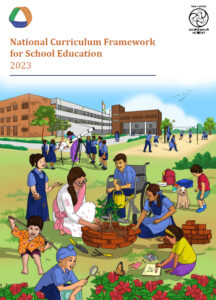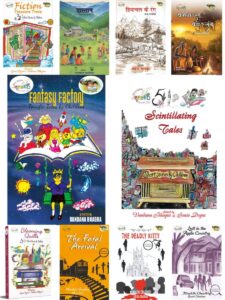The National Curriculum Framework for School Education (NCF) is developed based on the vision of the National Education Policy (NEP) 2020, and to enable its implementation.
 The NCF addresses education for the age group 3 to 18 years, across the entire range of diverse institutions in India. This is across the four Stages in the 5+3+3+4 Curricular and Pedagogical restructuring of School Education as envisioned in NEP 2020.
The NCF addresses education for the age group 3 to 18 years, across the entire range of diverse institutions in India. This is across the four Stages in the 5+3+3+4 Curricular and Pedagogical restructuring of School Education as envisioned in NEP 2020.
NCF from the NEP
The NCF brings to life the aims and commitments of the NEP.
- The Aims of Education are articulated in the NEP from which the curricular goals for the NCF are derived which then informs the rest of the elements.
- This includes the full range of human capacities, values and dispositions that are aimed to be developed in school education. Pedagogy, practices, and culture must work in tandem to develop these, and move away from an overemphasis on memorization and content accumulation; in fact, content reduction is required to create space for such development.
- The 5+3+3+4 Curricular and Pedagogical structure of school education is reflected in the learning standards, the content, the pedagogy, and the assessment approaches.
- It is integrative and holistic with equal status to all subjects and learning domains from Math to Sports. It integrates vocational education in all schools, and there is integration across subjects while developing rigorous subject understanding and capacities.
- It confronts and address real challenges facing our countries’ education system. Notably that of literacy and numeracy, rote memorization, narrow goals, and inadequate resources.
- It is deeply rooted in India. This is in content and learning of languages, in the pedagogical approaches including tools and resources, and most importantly in the philosophical basis – in the aims and in the epistemic approach.
Let us consider some of the directly relevant matters.
Curriculum
Curriculum refers to the entirety of the organized experience of students in any institutional setting towards educational aims and objectives.
The elements that constitute and bring to life a Curriculum are numerous, and include goals and objectives, syllabi, content to be taught and learnt, pedagogical practices and assessment, teaching-learning materials, school and classroom practices, learning environment and culture of the institution, and more.
There are other matters that directly affect a Curriculum and its practice or are integrally related while not being within the Curriculum. These include the Teachers and their capacities, the involvement of parents and communities, issues of access to institutions, resources available, administrative and support structures, and more.
Curriculum Framework
The Curricula across our country must be informed by and be fully responsive to the glorious unity and diversity of India. The imagination of NEP 2020, where institutions and educators are highly empowered – including to develop Curricula – is energized by this diversity and the nurturing of it. States have the Constitutional mandate to provide high-quality education to all children, and their own unique State contexts inform their own approaches to Curricula.
A Curriculum Framework must support exactly that – it is a framework to help develop all the diverse Curricula in the country, while enabling consonances and harmony across the country and providing a basis for quality and equity.
Thus, a Curriculum Framework provides the guiding principles, goals, structure, and elements for the development of Curricula, informed by which the syllabi, teaching-learning-materials including play materials, workbooks, and textbooks, and assessment methods will be developed by the relevant functionaries, including Teachers, in the States, Boards, and schools.
Objectives of this NCF
The overarching objective of this NCF is to help in positively transforming the school education system of India as envisioned in NEP 2020, through corresponding positive changes in the curriculum including pedagogy. In particular, the NCF aims to help change practices in education and not just ideas; indeed, since the word ‘curriculum’ encapsulates the overall experiences that a student has in school, ‘practices’ do not just refer to curricular content and pedagogy, but also include school environment and culture. It is this holistic overall transformation of the curriculum that will enable us to positively transform overall learning experiences for students.
Structure and presentation of the NCF to enable its Objectives
While based on the most current knowledge based on research and experience, this NCF aims to be understandable and relatable to, and usable by, practitioners of education, including Teachers and other educators, school leaders, and functionaries of the education system such as project officers, cluster and block resource persons, block education officers, teacher educators, examination boards, and curriculum/syllabus/textbook development teams.
The NCF also aims to provide the interested reader a reasonable understanding of what education should look like in our new vision for schools and why, and what role individuals could play as parents, community members, and citizens of India, who all have a large stake in Indian education.
Nevertheless, this NCF is designed with the Teacher as the primary focus – the reason being that the Teacher is at the heart of the practice of education. It is the Teacher who is ultimately the torchbearer for the changes we seek. As such, it is the perspective of the Teacher that must be carried by all, including syllabus and content developers, textbook writers, administrators, and others.
This NCF thus aims to adopt a presentation style and structure that enables the above objectives of readability, accessibility, and relevance. While it aims to articulate the underlying philosophy and principles, it does not simply leave it at the level of abstraction but also brings it to practice.
To enable this, and to communicate ideas with greater clarity, this NCF contains different levels of detail and specificity at the level of practice, with clear real-life illustrations in a variety of contexts. The Teacher or curriculum developers are not bound by these illustrations, but it is envisaged that this level of detail will help to make this NCF graspable, relatable, and useable.
This NCF also aims to account for the reality of the current typical institution and Teacher, while being entirely in harmony with the imagination of the best-resourced institutions. Thus, this NCF aims to be deeply rooted in the reality of our context, yet aspirational.



